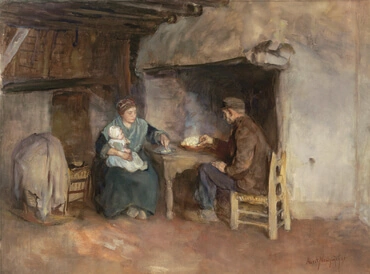3596. 'And have blessed him? Indeed, he will be blessed!' means that it was indeed joined to it. This is clear from the meaning of 'being blessed' as being joined to, dealt with in 3504, 3514, 3530, 3565, 3584. What is implied by making its own and joining to itself the truth represented by 'Jacob' may become clear from what has been stated already. But because these matters are such as to be beyond the range of anything grasped by the natural man and so cannot be seen except in the light in which the rational or internal man sees - a light in which few see at the present day because few are regenerate - it is better not to elucidate them any further, for the elucidation of things which are not known and which go beyond the range of a person's understanding does not throw light on them but rather puts them in the shade. What is more, such things ought also to exist as a superstructure built upon ideas of natural truths by means of which they can be grasped; but these ideas too are lacking at the present day. This also explains why the phrases prior to that under discussion here have been explained so briefly and solely as to the internal sense of the words used.
[2] From what has gone before one may see what is embodied in the fact that Isaac asked for venison from his son so that he might eat of it before he blessed him; and that he did not bless him until after he had eaten; and thus that after he had eaten there followed the blessing of the one who made and brought him the food, as is also evident from Isaac's words here spoken in reference to Jacob, 'He brought it to me and I have eaten from all of it before you came in, and have blessed him. Indeed, he will be blessed!' The reason is evident from an internal understanding of the rituals of the Ancient Church With them 'eating' meant making one's own and being joined to - joined to him at whose house they had eaten, that is, shared his bread. 'Food' means in general those things which are the signs of love and charity, that is, the very things that constitute celestial and spiritual food - 'bread' in that case meant things that are the sign of love to the Lord, and 'wine' those that are the sign of charity towards the neighbour. When these things had been made their own, those persons were joined together. They accordingly talked to one another from affection and shared one another's company. Feasts among the ancients were nothing else than this; the meals of consecrated things in the Jewish Church represented nothing else; and the meals at midday or in the evening which those in the Primitive Christian Church took together did not entail anything else.







